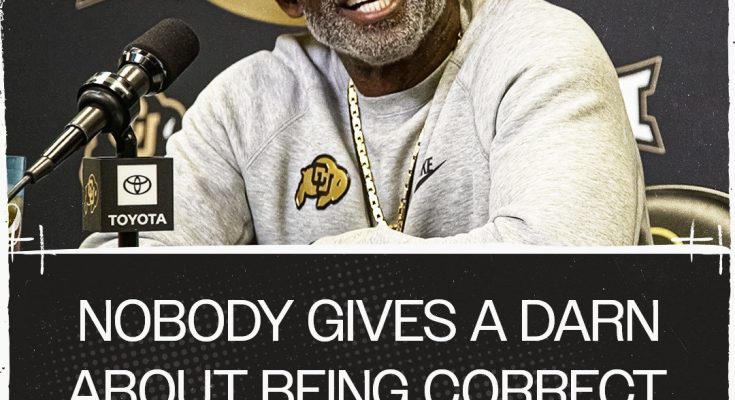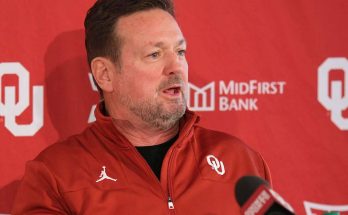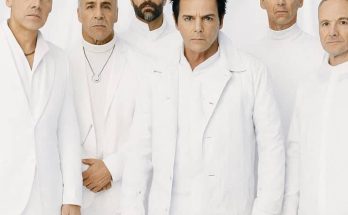Deion Sanders, affectionately known as Coach Prime, has never been one to hold back—whether in pregame hype, postgame reflection, or when it comes to addressing media speculation. When reports surfaced—most notably through outlets like Reuters—that Ryan Staub, previously a behind‑the‑scenes, hard‑working third‑string quarterback, would be handed the starting role for Colorado’s Big 12 opener against Houston, Sanders responded with the level of intensity and candor that has come to define his coaching persona. Those reports carried weight, painting an almost inevitable picture: Staub, fresh off a brilliant showing against Delaware (going 7‑of‑10 for 157 yards and two touchdowns), was being elevated to QB1, displacing the more heralded Kaidon Salter and freshman Julian “JuJu” Lewis. But Deion Sanders wasn’t having it—not yet. He pushed back, questioning not only the accuracy of the reporting but also the very motives of those choosing to disseminate it.
To be clear, one version of the story asserted that Ryan Staub would start, citing “multiple sources” and framing it as a fait accompli in what felt like a surprisingly quick demotion of Salter and Lewis. That report emphasized Staub’s impressive statistical showing and noted he had previously backed up his brother Shedeur Sanders, liking the trajectory of his performance—especially in clutch moments that included deep strikes to receivers Dekalon Taylor and Sincere Brown (Reuters). Another source went further, stating Deion Sanders had officially named Staub the starter, offering closure to Colorado’s unfolding quarterback drama (The Ralphie Report). These reports drew on Staub’s résumé, including a prior start in the 2023 finale against Utah, and highlighted how his steadiness and readiness had earned buzz as the team’s most reliable option (The Sun, Talksport).
But as the story gained momentum, Coach Prime took umbrage, calling out the media’s rush to judgment and perceived hunger for headlines over honesty. He stressed that no final decision had been made regarding who would start against Houston. Even though Staub had been receiving the bulk of first‑team reps in practice, Sanders purred carefully, affably yet unmistakably, that the quarterback choice remained unresolved, and that the media’s whiplash reporting was premature and flawed (Houston Chronicle, New York Post). His tone wasn’t conciliatory or vague—he framed it as a matter of media integrity, saying pointedly that “they prioritize speed over accuracy,” casting those who carried the story as more concerned with being first than being factual (New York Post).
By the end, Sanders sought to reclaim control over the narrative. He reserved the right to make his decision on his own timetable, not that of the press. He emphasized his desire for a consistent, reliable starting quarterback but conveyed that he would withhold comment until he was ready to “get to our destination”—a football metaphor masking his full control over the timeline and storyline (Bleacher Report, ESPN.com).
The backdrop to these media exchanges was Staub’s player status. A redshirt sophomore, Staub spent two prior seasons behind Shedeur Sanders, absorbing the offense and remaining steadfast, even when top prospects and transfers arrived. His teammates and observers had noticed this; Coach Prime himself had repeatedly hailed Staub’s value beyond the stat sheet, noting how vital he was to the quarterback room’s dynamics, to mentoring younger QBs, and simply being someone who stayed poised and focused, regardless of depth chart placement (SI, BVM Sports, Sporting News). His Delaware moment was undeniably electric. He took over in a high-pressure sequence, moving Colorado into the lead with savvy decisions and sharp throws, including a 21-yard TD to Dekalon Taylor just before halftime, followed by a 71-yard strike to Sincere Brown to open the second half—moves rarely seen from third-stringers in Boulder’s storied history (University of Colorado Athletics, CBSSports.com, BroBible, ESPN.com). He wound up leading the game statistically for the Buffaloes, even as Coach Prime reserved judgment on how the QB room would evolve (Reuters, The Ralphie Report, University of Colorado Athletics, Sportskeeda, CBSSports.com).
Meanwhile, STAUB’s story resonated with fans and pundits alike. Social media lit up with calls to “Put Staub in all season long,” praising his calm, steady leadership. A fan even wrote, “Someone tell Dan Orlovsky we got us a generational talent in Boulder Colorado!!!”—hyperbole, yes, but reflective of the emotional response to Staub’s performance (Gridiron Heroics). Former Heisman winner Robert Griffin III added his voice, lending gravitas by stating simply: “Ryan Staub should be the starting QB for Colorado” (Sportskeeda).
Yet amidst the praise and speculation, Sanders sought to temper expectations and remind the media—and supporters—that he would make his choices deliberately. He emphasized again, “I got a plan… I’m not gonna say it, but I saw what everybody else saw today,” maintaining strategic ambiguity even as the QB picture reinforced Staub’s rising stock (Bleacher Report, ESPN.com). The whimsical “Martin Luther Staub” quip underscored that he appreciated the narrative weight of Staub’s words—he, too, recognized the dramatic symmetry of “I had a dream”—but wasn’t about to let it define the decision process publicly (SI).
Coach Prime’s frustration with the media reflects a bigger, ongoing tension. He’s cultivated one of the most visible and dynamic coach personas in the sport—a constant presence on social media, in documentary form, in interviews—yet he repeatedly battles the narrative when it slips from being crafted to being presumed. His criticism of the media’s “integrity” in these QB reports echoes earlier skirmishes over access and scrutinyThere’s power in being constantly seen, but also peril in being frequently mischaracterized. By pushing back on the unofficial reports about Staub, Sanders was, once again, treading that fine line: keeping the spotlight on his team and choices while signaling that the control of information remains in his hands.
In essence, the saga around the Buffaloes’ quarterback decision and the ensuing media frenzy underscores several enduring truths about Colorado football under Coach Prime: that depth chart shifts can be dramatic and pulse‑quickening; that narrative sometimes outpaces decision; that performance matters—and can be unexpectedly decisive; but above all, that Deion Sanders insists on owning the moment, on making clear pronouncements on his schedule, not someone else’s. He wants first to be right, not just first.
Whether Ryan Staub ultimately lines up under center on Friday night against Houston, only Coach Prime knows for sure—and that ambiguity is exactly his point. He’s not letting the media’s desire for finality rush the process. Instead, he’s making it clear: in Boulder, the story starts with the man in charge calling his own shot



